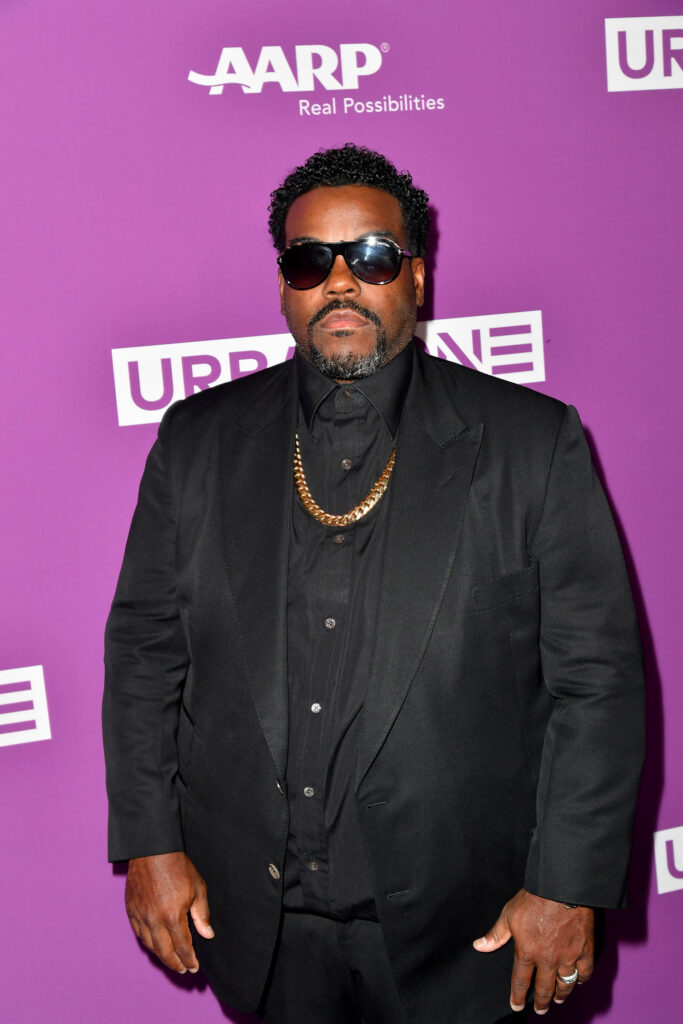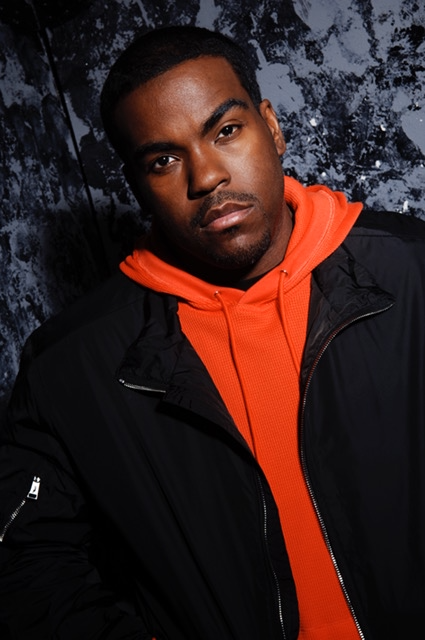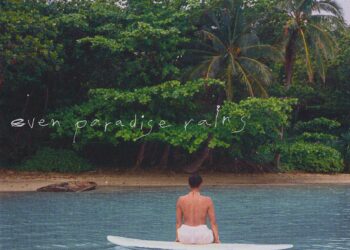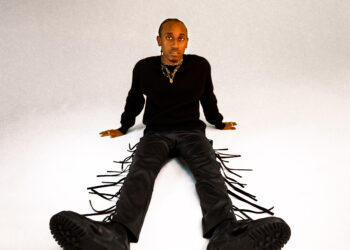Eighteen Grammy nominations (two wins). Sixteen top 10 hits on the Billboard Hot 100 chart. More than 170 million records sold worldwide. Countless classics across multiple genres. Rodney “Darkchild” Jerkins’ musical impact is undeniable. He’s one of the greatest producers of all time.
Jerkins has worked with a range of artists, including Michael Jackson, Janet Jackson, Whitney Houston, Mary J. Blige, Toni Braxton, Aaliyah, Brandy, Beyoncé, Ciara, Keyshia Cole, H.E.R., Tiffany Evans and the list goes on.
Before breaking into the music industry, the Pleasantville, New Jersey, native was an aspiring producer. He cut his teeth as a musician by learning to play the piano at age five.
By age ten, Jerkins knew that he wanted to be a producer. He spent time practicing his craft and researching rising and established producers to study, including Teddy Riley.
During his early teenage years, Jerkins produced demo tracks for local artists. By Jerkins’ surprise, Riley ended up coming across one of his demo tapes. It wasn’t long before Riley took Jerkins under his wing to become his mentor.
Eventually, Jerkins became a sought-after producer who attracted all sorts of talent, as mentioned above. Even as Jerkins ascended in the industry, he was passionate about helping promising songwriters and producers hone their craft.
“I believe it’s all about paying it forward,” Jerkins tells Rated R&B over a call. “Somebody gave me a chance. Teddy [Riley] and Diddy gave me a chance when I was a teenager.”
Some producers/songwriters Jerkins has mentored in the past include D’Mile, Harmony Samuels, Harvey Mason Jr. and Victoria Monét, to name a few. (In a recent profile with D’Mile, he shared stories about a few songs he worked on with Jerkins in the 2000s.)
Jerkins continues to seek new ways to connect and build with new talent. He recently partnered with Protégé, a new platform with a mission “to make access to dream career opportunities more meritocratic.”
Through Protégé, creators can send material such as beats, cover songs, original songs, etc. directly to Jerkins. He will provide personal feedback via video for all submissions. That’s not all. Jerkins will select ten of his favorite submissions and will invite the applicants to participate in a two-day, in-studio writing camp.
“Being in the position that I’m in right now, it’s incredible to be able to find new talent and give them an opportunity to be part of something great and help forward their career,” he says.
In Rated R&B’s interview with Rodney Jerkins, the super producer talks more about Protégé, what he looks for in new talent, his thoughts on today’s production and much more.
View this post on Instagram
You recently launched a new campaign through Protégé to find ten new producers to attend a writing camp with you. What inspired this move?
It’s just another way for me to give back [and] at the same time, find new talent. Protégé is creating a way for up-and-coming talent to have direct feedback from music veterans. For me, it was more [about] how can we create something to give back. And see if we could find the next batch of amazing talent that has yet to be discovered. I went to Protégé with the idea of doing these songwriting camps, like, “Hey, let’s do a camp that’s not limited to songwriters or producers or artists, but anyone who just has talent and believes in themselves. Let’s let them submit for this. If I think they’re great, we’ll bring them out for this camp.”
In a way, it seems like Protégé helps songwriters and producers cut through all the noise. I’m sure you get DMs from folks asking you to check out their music, which may be impossible to respond to in that format.
What’s beautiful about Protégé is it’s not like a competition where you’re getting pulled from a hat. You’re getting a visual response from me. You’re getting feedback. I’m telling you exactly how I feel about your submission. Even the ones that don’t get selected, it doesn’t mean that my video response to them doesn’t encourage them or the feedback that I give doesn’t help them to maybe correct what may be the problem.
What qualities do you look for when working with new talent?
I’m just looking for something unique. It’s funny because a lot of times people will submit stuff to me that sounds like me. I shy away from that. I don’t need another me on my team. I’m looking for something that’s different [and] that can add value to what we’re building. If it’s just a voice, I’m looking for a unique tone. If it’s production, I’m looking for unique sonics and sounds. If it’s a songwriter, I’m looking for a new perspective.
View this post on Instagram
Are there any general lessons you try to instill in new producers/songwriters you’re working with for the first time? What do you want them to take away from the experience?
Hopefully, we will find someone that we can sign to be part of our organization. But, I want them to leave encouraged. I want them to leave better than the way they came. I think [by] being around me [and] my team, it will happen naturally. We do camps all the time. I would love for people just to leave feeling like they’ve grown in such a short period.
Mentoring songwriters and producers isn’t a new thing for you. In the past, you’ve worked with talent early into their careers such as D’Mile, Harmony Samuels, Harvey Mason Jr. and Victoria Monét, to name a few. They all went off to do incredible things. What’s your reaction to seeing creators you guided carve a lane in their career?
It’s amazing because those were my protégés. D’Mile was probably about 17 when I first met him. He was staying at my studio in New Jersey and at my house in Florida. He [also] stayed at my studio in LA. He’s definitely been through the Darkchild boot camp. He’s been through the development of what I do. Before I called you, I was listening to some of his music. He’s grown so much in the last few years. To see that and to know that you can impact people in their careers is a blessing. Harmony Samuels is amazing. He hasn’t scratched the surface of what I know he’s capable of. He’s just really getting started. Then you got Tommy Brown, who did Ariana [Grande’s] last three albums. These are all my guys that were kids, pretty much, when I discovered them. Seeing them doing so well, I guess, is a testament to the development system that we have. This is why I love this whole Protégé idea because we can do a lot more (laughs).
Does seeing your protégés win inspire you in any way?
It keeps me on my toes. I always tell people, when they come under my wing, I say, “This is gonna be like college for you. You’re gonna learn a lot more working with me than you would learn working outta college, to be honest.” I just love seeing the growth. It lets me know that they listened. I don’t believe you could be successful without listening. I’ve been to Harmony’s setup. I’ve been to Tommy Brown’s setup to see their organization. It looks very similar to the way we had our organization set up. It makes me feel good to know that people are moving and going to the level that they dream of. I just tell them all the time: “Keep it up. Keep pushing forward. Don’t get complacent, but stay focused.”

You mentioned in a past interview that if you want longevity, you must reinvent yourself every three to four years. I often see conversations online about a lot of today’s producers going after the same sound. When you look at the charts from the ’90s or ’00s, you pick out five different hits from the same chart and they all sound different. What’s your take?
I talk about that often. I say it’s a different season now. I feel like producers back in that era had a specific sound. That was their sound and they were known for that sound. Nowadays, it’s so much cookie-cutter music out. So many different artists that’s making similar music. They all have access to the same sounds, where before we had to really dig, go through vinyls and chop up stuff in many different ways to get to our sounds. Now, it’s a lot of sound packs out there. Everybody is re-reusing the same sound packs, the same 808s, or whatever. It makes everything sound similar. But you also have people that are cutting through the clutter. You have a couple of unique perspectives and you recognize it when it happens. You’re like, “Oh, that’s definitely different from everything else.”
How do you build a signature sound while reinventing yourself every three to four years? How do you evolve your sound without chasing after what’s trending?
I don’t believe you keep the same sound forever. I think as times change, you have to change. You may have a little thing that reminds people of your sound, but I really think you have to move on. If you stay in the box, then you will become dated. It’s funny because I’ll get artists that will [say to me], “Gimme some of that ’90s stuff.” I’m like, “Why?” (laughs). They’ll be like, “Well, that’s what I want right now.” I’m like, “Okay, I can give it to you just exactly how it was when I did it, or I can give it to you in a new, creative way.” I don’t know if someone that made a hit in 1971 could do that same thing for an artist in 2022. I just don’t believe that. I think you have to find a new way to refresh yourself.
Right. When you look back at music from decade to decade, it sounds different. The sounds naturally progressed and evolved. You can hear a difference in music made in the ’60s versus the ’90s.
I get it because a lot of times you want to stay in that world and in that moment. I definitely think there are ways to refreshing things. We’re having a big hit right now with Burna Boy [“Last Last“]. Him and his producer sampled “He Wasn’t Man Enough for Me” by Toni Braxton. They took the same groove but switched up the cadence of the drums. They gave it a whole new life. It gives you the nostalgia of, “Oh, that was my jam back in the day.” The younger generation thinks it’s new. They’re like, “Yo, what? This is crazy.”
It might not have been the same result if he just completely copied the record and used the same drum program. I don’t think it would’ve been as great. But because he gave it a newer bounce, he put it in the clubs, now it’s giving it a whole new life. It’s going to be bigger now than it was back then because it’s gonna be more global.
Some fans believe producers are getting more ‘lazy’ when it comes to sampling. What are your thoughts on the way songs are getting sampled today?
It is true. I like it when it’s unique. When you think [about] what D’Mile did with Lucky Daye’s [“Over“] and how he took [Musiq Soulchild’s] “Halfcrazy” and how he just took something that was like a three-fourth time and it turned into a four-fourth time, which is crazy unique as a producer. You’re kind of thrown off when you first hear it because you’re like, “Hold on. Where’s there’s the beat coming? How is it gonna catch?”
Then when it comes in, you hear that knock, you’re like, “Yo, it’s crazy!” But you gotta remember the younger generation doesn’t know where that came from. They just think that it’s something new and fresh. They’re thinking like, “This is dope. This is my joint.” People want those sounds back. They want those similar sounds in a new refreshing way.
Get more information about Rodney “Darkchild” Jerkins’ Protégé campaign here.




